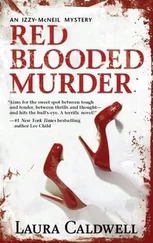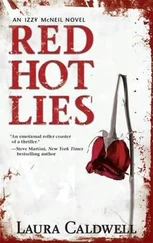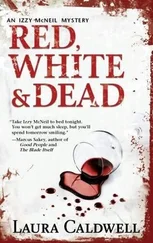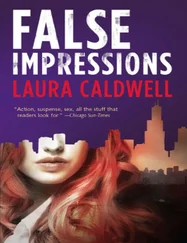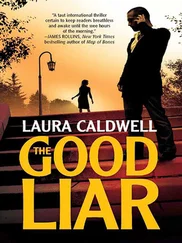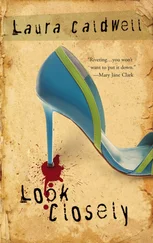“What’s going on here?” I said, ducking my head away from the approaching blades.
Laney had a sadistic-looking grin on her face. “He’s not Italian.”
“Mon Dieu!” Lino said, slapping his hands to his chest so that the scissors were pointed at his neck as if he might off himself. “That’s not true!”
“Oh yes it is.” Laney’s face was smug, almost triumphant. “First of all, mon Dieu is French, not Italian. Second, there is no hotel named Palazzo Mazzo in Ravello, and Salerno is not right next to Capri. You’re a fraud!”
Behind me, Lino froze, the scissors poised at his neck for a long moment. Then he leaned over my shoulder, toward Laney. “Keep your voice down, you little hussy,” he said in a clear Southern accent.
Laney and I both gasped. “Where are you from? Mississippi?” I asked.
“Tennessee. And don’t you say a word.”
“What’s it worth to you?” Laney still wore that sadistic smile.
Lino glanced around, then leaned back into our little circle again. “I’ll give her a free color, I’ll pop for a makeup application and then you two get the hell out of here.”
“Done!” Laney said, and they shook hands over my cape.
Two hours later, I emerged from Trevé, my hair a gleaming, coppery-caramel color and styled in a chunky, layered bob that made me feel cutting edge (no pun intended) and gorgeous. My face had been cleansed and moisturized and powdered and plucked; my eyes were smoky with brown shadow; my lips glistened with gloss.
“Girl—” Laney looked me up and down as we stood trying to hail a cab “—we are going to have one hell of a night.”
We went to Laney’s, since I had no desire to go back to the high-rise I couldn’t remember, and I had enough clothes now to last me a month. Laney had a loft apartment in Old Town, with lots of exposed brick and artsy charm.
She cranked up a Rolling Stones CD and tossed me a beer. It was dark outside, but the apartment seemed to be glowing. Because of our afternoon champagne infusion, we were feeling a little goofy, and we danced around her kitchen for a while, singing into our beer bottles.
“All right,” Laney said after a few songs, “I need to redo my makeup and find an outfit that’s going to make me look half as amazing as you. Come to my room and help me decide what to wear.”
“Sure.”
As I walked through the living room toward the bedroom, my eyes caught on the baskets of photos Laney kept by her fireplace—one for childhood and family photos, one for high school and college, and two more for recent pictures.
“I think I’ll flip through these for a second,” I said, sinking onto her couch and picking up the high school/college basket.
“No problem.”
I think she sensed what I wanted—to test my memory, to make sure it wasn’t only the last five months that I couldn’t remember.
She turned the music down a little, and soon I could hear the slide of hangers and the opening of drawers from the gaping door of her bedroom.
The few photos on top of the basket were of Laney’s college friends, people I’d known vaguely from when I visited her during that time. Normally, I would have flipped through all of them, but I was more focused now. I was looking for pictures of myself.
The first one I came to was a shot of Laney and me in Tijuana, and I got a swoop of relief through my belly, because I could remember that time perfectly. I could even remember the hot Mexican guy who’d taken the picture. We’d been in San Diego for spring break, and we took a day trip into “TJ,” as all the San Diegans called it. We were giddy with the exchange rate and spent the day buying bright, coarse Mexican blankets and silver jewelry before we spent the rest of our money on tequila shots and margaritas. The photo in my hands was taken right before the last bus back across the border, and both Laney and I were rosy with drink, huge careless smiles playing on our faces.
As I dug deeper, I hit on smaller photos, rounded at the corners, taken when 3x5 was the usual photographic dimension. One of my favorites was there—Laney and I standing in front of a row of gray lockers, my Nikon on a strap around my neck, Laney clutching a clipboard to her chest. It had been taken only three days after we’d met, and once again, I had a near perfect memory of that day. We’d been just outside the yearbook office when someone had said they needed a photo of us for the staff section. Both Laney and I wore too much makeup and tidal wave bangs—bangs that arched above our foreheads and came to rest below one eye. Right before the photo was taken, Laney leaned in and threw her arm around me, a gesture that made me nearly weak with relief. I’d hated being new in the school, but after that moment, I knew I was going to be okay.
I picked through the basket, looking for pictures of my old boyfriends, thinking that maybe the breakup with Ben had something to do with the memory loss, and maybe I wouldn’t remember my exes. But I easily found and remembered a picture of my high school boyfriend, Ted, whom I’d lost my virginity to in the stockroom of the convenience store where he worked, and Steve, my college boyfriend, who looked stoned as he posed in front of one of the landscapes he’d painted.
Laney has always called me a serial monogamist, but it’s not really an accurate term. While it’s true that I’ve had almost as many boyfriends as I’ve had first dates, I don’t go from one to another to another without a break. In fact, I’ve always tried to avoid that pattern, having seen my mother date a long string of guys, only to end up with heartbreak. Instead, I have serious boyfriends, and if we break up, then I’m alone—no blind dates, no pickups in bars—until I find someone I truly, truly want to go on a date with. Laney claims this trait has weeded out far too many candidates and leaves no room for flings. Her point is that flings are, by design, to be had with completely inappropriate men—the ones you find attractive, but would never date for one reason or another. And yet the whole fling thing has always seemed a waste of time to me, particularly given my goal of being married with one kid by the time I’m thirty-five.
I picked up a stack of pictures toward the bottom of the basket and quickly discarded them one by one onto the coffee table like a blackjack dealer. With each slap of a picture, I mentally listed the who, where and when, building up a confidence that most of my memory was intact. Senior prom with Ted, me in a hideous chartreuse gown that make me look jaundiced; Laney and me after a football game, clearly about to pass out; on the beach in Florida with Laney’s sister, Sophia; Laney’s kleptomaniac college roommate, Tara. When I came to one of Laney, Dee and me, my hands froze. I’d been a senior in college, full of myself and how cool I was. Dee was still in high school and had used the trip as an excuse to “check out the campus,” when what she really wanted was to drink beer and hang out with me.
In the photo, Dee’s light brown hair is short, and she’s laughing—as she so often was—sandwiched between Laney and me, her head turned slightly toward mine. The pain of losing her rushed in like a hurricane.
According to Ellen Geiger, the psychiatrist I’d seen, everyone who suffers the loss of a loved one ruminates (her word) on the last time they spoke to or saw the person. I was not the patient to change that pattern. For months afterward, it was all I could think about—the last time I’d spoken to Dee and the last time I’d seen her, in January.
Dee had driven up from the University of Illinois to visit me, and we’d spent the weekend in our usual way—shopping during the day with Mom for clothes and boots and jewelry we didn’t need, and at night going out with Ben and Laney, regaling them with stories of the astounding mix of freaks and psychopaths our mother used to date. Ben and Laney adored Dee as much as I did. It was hard not to. She had a little-girl way of holding her head down and drawing her eyes up that made you want to take care of her, and yet she could drink like a Russian soldier. And that laugh of hers was impossible not to love—a buoyant, soft-at-first chuckle that grew into a belly laugh.
Читать дальше

